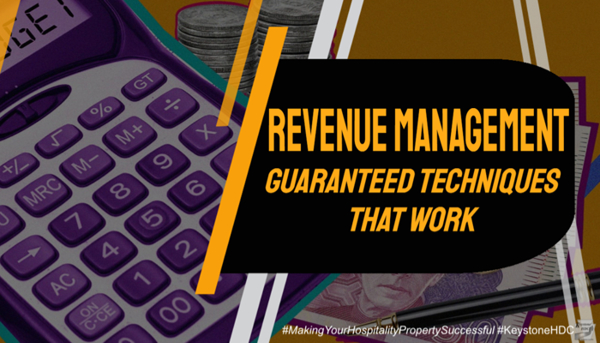.
.
Efficiently managing rates and availability while watching on all the different key performance markers takes training and talent.
You need to understand revenue management and I will guide you.
Welcome to another edition of Hospitality Property School.
I am your instructor, Gerry MacPherson.
.
Revenue Management Introduction
Your guest room is a perishable product.
For this reason, pricing and customer happiness remain extremely important variables.
For you to consistently succeed, you need to understand revenue management and why it is important.
In this edition, I will explain why daily audit reports are necessary for the success of any hospitality property and which reports are the most important?
.
.
Why did you want to become a hospitality property owner?
.
- The idea of becoming a hospitality property owner and greeting guests sounded appealing.
.
- You were tired of the rat race and wanted to take control of your own destiny.
.
- Or like most owners, you wanted to make money or even better, to make more money in less time
.
One of the main factors you need to be successful and make more money in less time is for you to understand revenue management and why it is important.
It is what propels hotels, resorts, inns and bed and breakfasts success.
It does not matter the size of your property, a guest room is a perishable product since the number of guest rooms you have is defined. For this reason, pricing and customer happiness remain the very important variables, which are subject to Hospitality Property Revenue Management.
Efficiently managing rates and availability while watching on all the different key performance markers takes training and talent. Branded hospitality property chains have departments that only focus on these reports which results in a well-organized revenue management strategy. This is not the same for smaller properties because time and resources are limited, might take a short-term approach to revenue management.
Knowing how to understand the reports is an invaluable resource because they can help hospitality property owners make choices that will result in positive outcomes.
Key Performance Indicators (KPIs)
You need to know and understand the following numbers to manage the revenue of your hospitality property.
.
- Occupancy Rate
.
- Average Daily Rate (ADR)
.
- Revenue Per Available Room (RevPar)
.
- Total Revenue/Rooms Sold
.
.
Occupancy Rate
This is one of the easiest metrics you can check.
It is the percentage of occupied rooms compared to total rooms over a certain period of time.
.
Occupancy = Rooms Occupied / Rooms Available
.
Knowing these numbers will help you create the foundation of your revenue management strategy.
.
.
Revenue Per Available Room (RevPar)
RevPar is an operating metric that is analyzed by multiplying hospitality property’s average daily room rate by its occupancy rate.
You can also analyze RevPar by dividing a hospitality property’s revenue by the number of rooms (or beds) it has over a desired period of time.
.
RevPar = Total Room Revenue / Rooms Available
.
RevPar only uses room revenue and does not include other revenue streams such as upgrades, spas, restaurant revenue, etc. You can use this analysis to compare performance to other properties, but it could fluctuate greatly by property type.
.
.
Average Daily Rate (ADR)
ADR calculates the average price paid per room and helps you determine how much money was brought in per room. You calculate ADR by taking the Room Revenue and dividing it by the number of paid rooms occupied.
.
ADR = Room Revenue / Paid Rooms Occupied
.
ADR only considers the rooms that were sold – does not include vacant rooms.
Other Important Metrics
There are other important metrics you need to consider when you create reports.
They include:
- total rooms sold
.
- total revenue
.
- revenue divided by category (i.e. rooms. restaurant, spa, etc.)
.
 |
Books with Tips & Strategies for Your Hotel, Resort, Inn,
|
.
It all starts with the approach to revenue management
- You Have to Take a Long-Term Approach
.
- Use Market Information
.
- Analyses
.
One of the major differences between large-branded hospitality property and smaller independent properties is forecasting.
Quite often, an independent property owner will look at the current month’s revenue & forecast and might decisions that will affect the entire year. A larger or branded hospitality property will take a look at how the current day and month play into the season, quarter, and year.
Even though smaller independent hospitality properties do not have the same resources as larger properties, there are a few things you can do.
.
.
Take a Long-Term Approach
When you only look at your revenue strategy on a monthly, your property could be leaving money on the table. Larger properties generally look at revenue and rates by quarters and seasons, rather than by months. When you take a more long-term approach to rates and revenue, you can more correctly react to current market conditions.
For example, if you’re in the high season and bookings are soft, you have an idea of what you need to make up in the following months. Or, if your next month’s bookings are higher than expected, you can raise rates to make up for this month’s lost revenues.
If you handle your rates and revenue monthly, you are more likely to make thoughtless reactions. This means you might make needless changes that could end up costing you more than your current situation.
For example, if your current bookings are too soft, your first reaction might be to reduce rates to increase demand. But, if you take the whole season into consideration, you might realize that you last month’s performance was pretty good and you need not worry about fewer bookings at regular prices. More guests in your property don’t always mean more revenue generated.
.
This is why your ADR is so important.
.
You can lower your rates and generate more demand, but you have to make sure your revenues and profit are still higher.
The thing to remember here is that you should be looking at your rate and revenue targets by quarter or season instead of monthly. Every property is different, so there is no definitive forecast structure that makes sense for every property.
.
.
Use Market Information
Large branded hospitality properties have the benefit of knowledge. They have the resources to purchase market reports that include information about rates, availability, and projected demand.
If you don’t have the resources to buy your own market research reports because they are expensive, you can also check your local tourism websites and offices for up-to-date information. Tourism offices often publicly release information on demand forecasts, upcoming events, and other information that could be useful while planning out the demand that influences rates.
You want to make yourself aware of market trends as well as local travel trends to have the most success. Knowledge is power and you want to prepare yourself as much as possible.
.
.
Write Analyses
Large branded hospitality properties write analyses every month that report on how rates and revenue performed.
This could be very time-consuming for any hospitality property owner, so you might want to consider just analyzing those months where you don’t meet your goals. This is important because it means that you did not correctly read the market.
Detailed reports containing how and why you missed your goals will help you prevent those mistakes in the future.
Analyses are particularly helpful for the same season next year when market trends tend to copy each other. Without analyses, you might not remember exactly what happened a full year earlier.
Once you are comfortable putting together the analyses, you could start doing the same for the good months. If you make a decision and read the market correctly, you will likely want to remember what you did to replicate it in the future.
By learning and understanding the Key Performance Indicators and following the three steps to revenue management
- Take a Long-Term Approach
.
- Use Market Information
.
- Analyses
You will be able to operate your hospitality property like the large branded properties and stay ahead of your competition.
.
Are you staying with me so far?
Let me know by leaving a short comment
.
Now, I’m going to take a look at the Reports You Need for Your Revenue Management Strategy
A healthy revenue management strategy requires daily upkeep.
Many hospitality properties will conduct their reporting in the late evening when most of the check-have arrived and guests are tucked in for the night.
Nightly reports will help you close out the present day and prepare for the next.
.
.
List of Reports You Should Run Every Night
Room and Tax Report
This report is fairly clear. The room and tax report list all your room revenue and taxes for the day. You want to run this report daily in order to know exactly how much money is coming into your property each day and then use this report to identify possible issues.
For example
You can compare it to your arrivals, departures, and continuous reports to make sure that your revenue falls within a normal range for your existing occupancy.
.
If you decide not to run this report, it could cause you problems.
For example
If someone did not check out, but their revenue posted, it will cause accounting problems later on. Instead of having to make an adjustment, you can catch it immediately and lessen the disorder later.
.
.
Shift Audit Report
Each front desk agent or user needs a shift audit report at the end of their shift or the day. The report includes a breakdown of every transaction sold by category and item. It also should include a breakdown of the methods of payment, including
- cash
.
- credit cards (Mastercard, Visa, AMEX, etc)
.
- and any other means
This should be used for each front desk agent or user to balance their daily shift by checking and balancing each revenue and cost source.
.
The shift audit report needs to include:
- Cashier or User ID
.
- Category/Department Breakdown
.
- Payment Type Breakdown
.
On the top, the transactions are sorted by category and item.
After each item, there is a subtotal and under each category is a department grand total.
Then there is a payments section that lays out each form of accepted payments.
You will then have the grand totals for both departments to compare to the payments grand total – make sure they match.
If the grand totals will not match, you’ll be able to find where the payment discrepancy occurred with these reports.
If these daily audit reports are not complete by staff, it could create accounting problems in the future. These reports allow you to see patterns, track them over time, and identify problems when they occur.
It also helps keep employees in check. A daily report will show discrepancies in the cash flow or inventory levels. If there is missing cash or missing inventory, you’ll know exactly who was in charge during that time period.
Daily audits will help you easily create monthly reports, which help quarterly reports, which then help yearly reports and beyond.
.
.
Departures Report
Every night, your night manager or auditor should create two departure reports, one for the present day and one for the next day.
The present-day departures will show everyone who was supposed to check-out that day. This will help identify any guests that didn’t check-out and identify other possible issues such as overbookings.
The next day’s departure report helps your staff prepare for the next day’s departure. Your front desk needs to know which rooms will be vacant and available for incoming reservations and cleaning staff will need to take the necessary steps to prepare the rooms.
.
Each report should include the following:
- Room assignment
.
- Reservation/Confirmation Number
.
- Guest Name
..
- Arrival Date
.
- Departure Date
.
- Room Status (in-house, checked-out)
.
- Balance
.
If complete nightly departure reports are not done, you could put yourself at risk for overbookings.
Arrivals Report
The night manager or auditor should also produce the arrivals report that includes the list of arrivals for the upcoming day and includes basic information:
- Reservation/confirmation number
.
- Guest name
.
- Arrival date
.
- Departure date
.
- Number of nights
.
- Room type booked
.
- Room assignment
.
The report helps you identify which guests have been assigned rooms and those who have not. You have to make sure that the assigned rooms will be open when the guest is scheduled to check-in and assign where unassigned guests will stay.
Use the departure report to ensure the arrivals list match up and make necessary changes.
The arrivals report also helps you keep track of no-shows. If a guest doesn’t check-in and cancels their reservation, your arrivals report will show it. You can then make the necessary changes in your property management system so that your daily audits and departure reports remain accurate.
Arrivals reports help prevent overbookings while enabling you to plan out the day’s logistics.
.
.
Housekeeping Report
The housekeeping report shows the property’s room number, front desk status, housekeeping status, departure dates, and unit type.
This enables the front desk and the housekeeping staff to know which rooms have to be cleaned and by when. Housekeepers need to know which rooms are being checked out of so they can prepare to replace bedclothes, towels, amenities, etc.
This might not be necessary for smaller inns or bed & breakfasts.
Without this report, properties run the risk of check-in delays because rooms are not cleaned.
Also, if guests have not checked out by the allocated time, housekeeping will know to contact the front desk and get the problem sorted out.
.
.
Continuous Report
A continuous report helps you keep track of guests who have extended their stay. When a guest extends their stay, often, a new reservation will have to be created.
It is also possible that continuous reservations might mean the rate per night is different. The accurate room rate needs to be reported to your room and tax report so all is correct.
If you don’t complete a continuous report, you run the risk of assigning arriving guests to occupied rooms.
The six reports will help you keep track of your daily revenue and effectively manage your reservations.
Once you have these reports running effectively, you’re ready for the next step.
.
.
The following reports will give your hospitality property a competitive advantage.
Sell Strategy Report:
The Sell Strategy Report includes;
- monthly analyses
.
- market research
.
- customer segment performance
.
- including ADR and RevPar
.
A large branded hospitality property will divide its guests by group in order to see who their most profitable and target them appropriately.
.
.
Daily Pickup Report:
This report shows the daily rates and ADR for any given day and is generally run every day to keep prices active. It helps the revenue management team analyze which rates are selling or not selling for the given day and how to proceed. If rates are meeting their goals and projections, they know they’re on the right track. But, if not, they can make corrections in real-time.
.
.
In Conclusion
Effectively managing your revenue when you’re an independent hospitality property can be difficult but by taking a long-term look at your revenue management strategy and use all the available information with these few reports to your advantage, you too can act like the big boys while staying small.
.
Do you currently have a revenue management strategy?
Let me know in the comments.
.
You will have access to this episode for the next six weeks and then it will get locked in the vault for Hospitality Property School Group members only.
When you see that we have something new, don’t mark it “Unread” or file it away in the belief you’ll read it later because you might miss your chance.
To see all the other valuable material you’d have access to as a member of the Hospitality Property School Group, check out the short video in the episode post-show notes.
.

.
.
In the next episode, I will talk about 7 Secret Strategies That Hotels Can Use to Benefit from Online Travel Agencies.
.
.
That’s it for today’s episode,
Until next time, have a fun day.
.
Make sure you have signed up for your episodes of INNsider Tips. You can find the link in the show notes.
.
⇒ TO READ OR LISTEN TO THIS EPISODE ON KEYSTONE HOSPITALITY PROPERTY DEVELOPMENT:
https://keystonehpd.com/revenue-management-guaranteed-techniques-that-work-231
.
.
Get Your INNsider Tips
.
.
Join one of your private groups
https://keystonehospitalitydevelopment.com/private-groups
.
.
Say hi on social
Facebook: https://www.facebook.com/KeystoneHDC
.
Twitter: https://twitter.com/KeystoneHDC
.
LinkedIn: https://www.linkedin.com/company/keystone-hospitality-development
.
.
Listen to The Hospitality Property School PODCAST here
keystonehpd.com/hospitality-property-school-podcasts
.
.
YouTube
.
.
A Division of Keystone Hospitality Property Development






